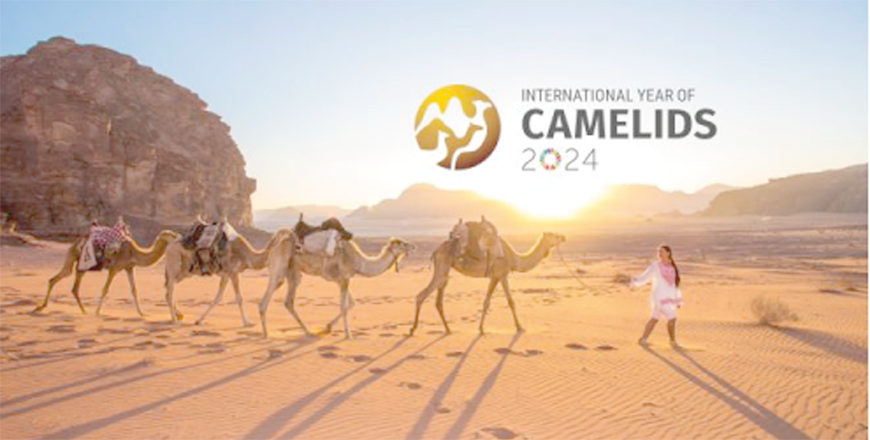AMMAN — The United Nations declared 2024 the International Year of Camelids (IYC) and is encouraging governments, cities, researchers, journalists, companies, and individuals to promote this unique year. This IYC highlights how camelids are key to the livelihoods of millions of households in over 90 countries. Camelids include alpacas, Bactrian camels, dromedaries, guanacos, llamas and vicuñas, according to the statement., according to a statement for The Jordan Times.
In response to the UN’s global call to action, the National Agricultural Research Centre (NARC), in partnership with Camelera and From Farm to Fork in Jordan, is organising the event “Ships of the Desert” in Wadi Rum on 16 and 17 May 2024, to connect local camel breeders and Bedouin communities with agricultural experts, tourism experts, press and chefs. The event aims to raise awareness about the societal importance of camels, sustainable camel breeding, health benefits of camel products, responsible tourism and sustainable gastronomy.
These resilient animals contribute to food security, nutrition and economic growth and hold a strong cultural and social significance for communities around the world. Bactrian camels and dromedaries are called “Ships of the Desert” for their capacity to survive in challenging circumstances, travelling vast distances in often extreme conditions, and surviving long periods without water. Camelids play an important role in advancing the Sustainable Development Goals related to the fight against hunger, the eradication of extreme poverty, and the sustainable use of terrestrial ecosystems, accrdoing to the statement.
From providing milk, meat, and fibre to transport of products and people, and organic fertiliser, camelids thrive where other livestock species cannot survive. On the website of the Food and Agriculture Organisation of the UN (FAO), camelid events are currently listed in Argentina, Peru, UK, Austria, France, Italy, Somalia, Russia, Mongolia, and India. Within the Middle East and North Africa, NARC & partners are taking the lead with the first event in the wider region to celebrate the International Year of Camelids.
Camels are “ships of the desert” woven into the very fabric of Jordanian culture tracing back to the ancient Arab trade routes that bridged the East and the West. Camel caravans laden with silk, spices, foods, incense and other luxury goods embarked on epic odysseys through South Arabia and the Levant, across the Silk Road, the Spice Route, and the Incense Route to be shipped from the ancient port of Gaza across the Mediterranean, the statement said.
These routes made Arabia the Cradle of Trade where oasis towns with caravanserais flourished into vibrant cities like Palmyra and Petra. Beyond commerce, these trade routes were the communications highways of the ancient world; not only transporting for trade, but also transferring innovation, knowledge, art, culture, languages and social customs.
The event in Wadi Rum reflects on this rich heritage while addressing the future of camelids in Jordan. The event activities include NARC workshops for camel breeders, interactive sessions about the role of camels in responsible tourism, and a 100 per cent local 100 per cent seasonal ‘From Farm to Fork dinner’ with camel products.
Director-General Nizar Haddad said, “Our mission is to work with our partners to enhance NARC’s role as a national umbrella for agricultural research to achieve sustainable, resilient development and optimal use of natural resources.” Haddad added, “We conduct research on camels in the south of Jordan, breeding programmes, fodder, and pasteurisation and we wish to share our knowledge with the local communities.” Camelera is an incubator under the umbrella of NARC which launched the Agricultural Innovation and Entrepreneurship Incubator programme in 2019 to transform creative and entrepreneurial ideas into real projects that enhance the national economy, sustainable development and create job opportunities.
Camelera is a newly established company that aims to revitalise the camel breeding industry in Jordan by reimagining the relationship between humans, camels, and the environment. CEO Sami Allawama said, “Our mission is to create a sustainable supply chain, empower camel breeders, and deliver high-quality camel milk as a sustainable smart food [functional food] while raising awareness of the vital role of camels in our culture and nutrition.” Camel milk boasts a unique nutritional profile, brimming with vitamins, minerals and naturally occurring probiotics. Studies have shown its potential benefits in managing diabetes, allergies, and certain auto-immune disorders, according to the statement.
From Farm to Fork in Jordan is a culinary tourism project by Hospitality in Health (HIH) and partners that promotes responsible tourism and sustainable gastronomy in Jordan. The project is aligned with the UNWTO guidelines for Gastronomy Tourism, Slow Food, and the Economic Modernisation Vision related to Green Growth and Destination Jordan.
HIH Owner Nicolas Dingemans said, “We have two missions. Our inward mission is to position the Kingdom as a meaningful food destination that tells the story of Jordan and the Levant. Our outward mission is to meet the ethical culinary expectations of conscientious tourists and business travellers, while encouraging a healthy food culture for local residents.”
Since its launch in 2021, the project resulted in various culinary videos, articles, awareness events, From Farm to Fork dinners, and culinary tours with local chefs and visiting Michelin chefs, supported by the Jordan Tourism Board. This summer HIH will publish the culinary book ‘From Farm to Fork in Jordan’, featuring 24 farmers, 24 chefs, and 24 hero-products from all 12 governorates. Dingemans added, “Camel products, Olive Oil, Jameed, Dates, and Za’atar are the five hero-products that will be highlighted as traditional smart foods that are woven into the very fabric of Jordanian culture,” the statement said.
